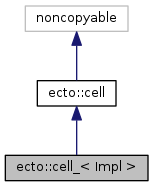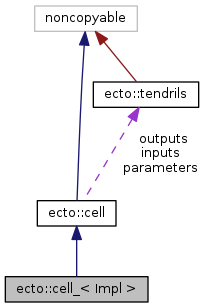cell_<T> is for registering an arbitrary class with the the cell NVI. This adds a barrier between client code and the cell.
More...
|
| | cell_ () |
| |
| | ~cell_ () |
| |
| void | dispatch_declare_params (tendrils ¶ms) |
| |
| void | dispatch_declare_io (const tendrils ¶ms, tendrils &inputs, tendrils &outputs) |
| |
| void | configure (const tendrils &, const tendrils &, const tendrils &, not_implemented) |
| |
| void | configure (const tendrils ¶ms, const tendrils &inputs, const tendrils &outputs, implemented) |
| |
| void | dispatch_configure (const tendrils ¶ms, const tendrils &inputs, const tendrils &outputs) |
| |
| void | activate (not_implemented) |
| |
| void | activate (implemented) |
| |
| void | dispatch_activate () |
| |
| void | deactivate (not_implemented) |
| |
| void | deactivate (implemented) |
| |
| void | dispatch_deactivate () |
| |
| ReturnCode | process (const tendrils &, const tendrils &, not_implemented) |
| |
| ReturnCode | process (const tendrils &inputs, const tendrils &outputs, implemented) |
| |
| ReturnCode | dispatch_process (const tendrils &inputs, const tendrils &outputs) |
| |
| void | start (not_implemented) |
| |
| void | start (implemented) |
| |
| void | dispatch_start () |
| |
| void | stop (not_implemented) |
| |
| void | stop (implemented) |
| |
| void | dispatch_stop () |
| |
| std::string | dispatch_name () const |
| |
| std::string | dispatch_short_doc () const |
| |
| void | dispatch_short_doc (const std::string &) |
| |
| cell::ptr | dispatch_clone () const |
| |
| bool | init () |
| |
| Impl & | impl () |
| | Grab a typed reference to the implementation of the cell. More...
|
| |
| const Impl & | impl () const |
| |
| | cell () |
| |
| virtual | ~cell () |
| |
| void | declare_params () |
| | Dispatches parameter declaration code. After this code, the parameters for the cell will be set to their defaults. More...
|
| |
| void | declare_io () |
| | Dispatches input/output declaration code. It is assumed that the parameters have been declared before this is called, so that inputs and outputs may be dependent on those parameters. More...
|
| |
| void | configure () |
| | Given initialized parameters,inputs, and outputs, this will dispatch the client configuration code. This will allocated an instace of the clients cell, so this should not be called during introspection. More...
|
| |
| void | activate () |
| | Activate the cell. i.e. Put it into a "ready" state, opening sockets, etc. More...
|
| |
| void | deactivate () |
| | Deactivate the cell. i.e. Put it into an "unready" state, closing sockets, etc. More...
|
| |
| void | start () |
| |
| void | stop () |
| |
| ReturnCode | process () |
| | Dispatches the process function for the client cell. This should only be called from one thread at a time. Also, this function may throw exceptions... More...
|
| |
| ReturnCode | process_with_only_these_inputs (const tendrils &connected_inputs) |
| |
| std::string | type () const |
| | Return the type of the child class. More...
|
| |
| std::string | name () const |
| | Grab the name of the instance. More...
|
| |
| void | name (const std::string &name) |
| | Set the name of the instance. More...
|
| |
| std::string | short_doc () const |
| | Set the short_doc_ of the instance. More...
|
| |
| void | short_doc (const std::string &short_doc) |
| | Set the short_doc_ of the instance. More...
|
| |
| void | reset_strand () |
| |
| void | set_strand (ecto::strand) |
| |
| std::string | gen_doc (const std::string &doc="A module...") const |
| | Generate an Restructured Text doc string for the cell. Includes documentation for all parameters, inputs, outputs. More...
|
| |
| void | verify_params () const |
| |
| void | verify_inputs () const |
| |
| bool | process_connected_inputs_only () const |
| | Processing mode query - only connected tendrils or all. Typically used by the scheduler to arrange input tendrils when invoking a process. More...
|
| |
| void | set_process_connected_inputs_only (const bool &value) |
| |
| ptr | clone () const |
| |
template<class Impl>
struct ecto::cell_< Impl >
cell_<T> is for registering an arbitrary class with the the cell NVI. This adds a barrier between client code and the cell.


 Public Types inherited from ecto::cell
Public Types inherited from ecto::cell Public Member Functions inherited from ecto::cell
Public Member Functions inherited from ecto::cell Public Attributes inherited from ecto::cell
Public Attributes inherited from ecto::cell 1.8.11
1.8.11